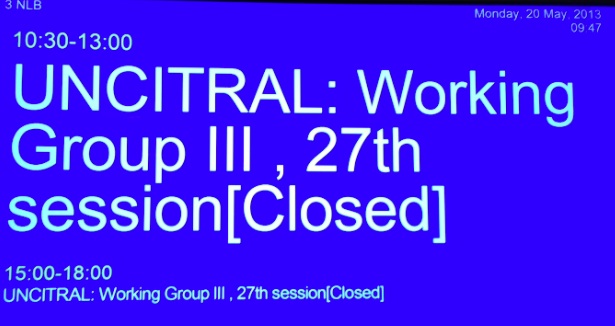UNCITRAL Working Group III
NOTE: All daily posts for the week of UNCITRAL meetings will be contained as additions to this post – scroll down to see the posts day-by-day.
Monday, May 20, 2013
I’ll try to post a note at the end of each day this week about what is happening in the Working Group meeting – not to try to track each moment in the debate, but to present a general notion of the way the discussion is moving.
–
Itzhak Perlman, the great violinist, once remarked that he liked to practice at home with a game of cricket playing in the background on his television. It was possible, he said, to concentrate on his music for an hour, glance at the cricket game for a couple of minutes, and understand all that had happened in the past hour.
–
That is not a bad way to think about the state of things with the UNCITRAL Working Group III. Over the past couple of years, one could concentrate elsewhere for six months, then check back in with the Group to find the same issues and arguments on the table, or at least be able to catch up quickly on the glacial movement from meeting to meeting.
–
One difference this time around is that the buzz in the room this morning before the session opened was about the need to make some progress, and the threat that the failure to make progress might lead to dissolution of the Working Group. The opening remarks by both the Session Chairman and the Working Group Secretary echoed this feeling – barely disguised but carefully worded threats to the effect that a lack of progress this week could find the July meeting of the Plenary being displeased to the point of pulling the plug.
–
There was also some buzz about a presentation that the delegation from Columbia will make during one of the lunch breaks this week. They have initiated a process in Columbia that treats B2B separately from B2C, and which uses arbitration in a focused way for B2B, disputes. The assumption is that they, or someone, will offer a resolution to consider B2B ODR first, get an agreement, then move back to B2C ODR later.
–
In fact, Columbia did introduce that idea, which was quickly countered by a motion by the EU to consider a system whereby states could opt-in or opt-out of an arbitral outcome based on the status of their national laws on pre-conflict arbitration clauses.
–
Among others, the EU, Germany, and France support the opt-in/opt-out approach, which was introduced by the EU through a “non-paper”, which is a term I’d not encountered before. When asked what a non-paper was, one of the delegates from a country not supporting the EU motion said, “it’s what they produced.” Enough said.
–
Japan and the US, among others, supported Columbia’s approach for sequencing – B2B first, then B2C, with no limitation of the Working Group’s mandate. Egypt’s contribution was that arbitration is not an acceptable solution, because of cost and other factors, and that it is not the approach used for their consumer disputes.
–
After a break to consider the situation, the Chair did not see enough support for either of the options introduced today to discard the two track system that is contained in Working paper 119 and addenda, Section 8, from the last meeting in Vienna. This is a two-track approach, with a “proceed to arbitration track” and a “termination after settlement or failure track.” Check out the link below for the language from the document produced after the Vienna meeting.
–
–
To some degree, the afternoon devolved into a giant editing session, with input about the impact of various approaches to wording the Section 8 paragraphs. Tomorrow morning starts with the US having the floor to make further comments.
–
Tuesday, May 21, 2013
The discussion picked up this morning with US comments on the two-track approach contained in the Working Paper from the most recent Vienna meeting. My post yesterday probably danced right up to the line of being a bit too much info about the proceedings, but at the end of the day, literally, we wound up with a very public document on the table for discussion, so, no harm, no foul.
–
Without giving a blow-by-blow of the discussion today, I would just note that in my opinion the overall direction of the debate at these meetings begins with a fundamentally flawed view of how “enforcement” should be handled in an international e-commerce ODR scheme. It has always seemed to me that B2B and B2C disputes in the international e-commerce world exist in two different universes.
–
B2B disputes may be of sufficient value to make pursuing enforcement in some legal context worthwhile, so the details of what constitutes an enforceable agreement under the New York Convention, and when it becomes enforceable, may be important.
–
B2C disputes, however, are in great part likely to be of insufficient value to make it worthwhile to pursue enforcement in any formal legal channel, even if that channel is well thought out and clear. B2C disputes exist in a universe where approbation or naming and shaming of bad actors is probably more powerful and more of a deterrent to bad behavior than any formal legal system. Bundling B2B and B2C in the same debate and creating one system to handle them, as the Working Group has done so far, pretty much guarantees that the B2C disputes will get short shrift and that consumers, as a result, will not be well served.
–
All of this highlights the situation with UNCITRAL – the debate so far has centered on “access to justice” as “access to courts or formal legal systems,” not on access to acceptable and useable avenues to pursue grievances or get some sense of closure. I actually heard one delegate, from which delegation I won’t say, offer the opinion that, in a comparison of arbitration and mediation, mediation actually works against the interests of the consumer. I don’t know what rationale was used to come up with that opinion, and I didn’t get a chance to ask, but just on its face it doesn’t make sense to me.
–
Probably the most interesting issue today, without getting into specifics about delegations, etc., was a procedural one, highlighting the fact that official documents need to be translated into the six official languages of the UN, and that just doing that takes a good bit of time and slows down the process.
–
Tomorrow is mid-week – counting down toward “progress” this week.
–
Wednesday, May 22, 2013
–
Most of the day today was spent in the pursuit of final language for one of the sections contained in the “two track” approach brought forward from the last Vienna meeting. The major new factor in the discussion was brought in by the delegation from Columbia, via a lunch time presentation on new legislation that will establish chartered online arbitration centers (in addition to “paper” arbitration centers) that will have the ability to hear and decide cases (except family law cases and criminal cases). The process in Columbia is a two-step process: the law has been passed, but the implementation phase has not taken place, so the best guess is that the system will be implemented some time later this year. There are a couple of things that I find really interesting about the system. First, it seems that the system will be market driven in the sense that once the online centers are blessed by the government, they can charge what they like, and they can set up rules of procedure that may or may not be mirrored in other centers. It would be up to the customers (the businesses and consumers) to choose which center they would use based on price, process, etc. Second, the arbitral decisions will be rendered ex aequo et bono, which is to say that the arbitrator will be able to render a decision based on her or his best judgment about what is proper and fair, with the ability to cite legal precedent or legal bases, or to ignore legal precedent and bases. What’s more, if an arbitrator cites an interpretation of a law as part of the basis for what is fair and just, and one party argues that the arbitrator has incorrectly interpreted the law – that’s too bad: the arbitrator’s sense of justice stands. As an aside, language regarding ex aequo et bono in the Working Paper being discussed in the larger UNCITRAL Working Group III discussions caused quite a stir, and in fact, as I understand it, will probably not make it into the final language. Of course, the Columbian system is a national system and decisions made there will not be enforceable in other jurisdictions. For a copy of the power point slide deck from the Columbia presentation, click here: Slides
–
Thursday, May 23, 2013
–
The discussion this morning turned, after a late start and a statement from the Chair, from language for the overall process to language describing the nature of the third party or third parties – whether the third party for the mediation phase could or should be the same third party as the arbitrator who would issue an award. Again there are states that have laws that prohibit the same third party from playing both roles, and some do not. I think, at least in my experience, the “best practice” guidance would be to not have the mediator become the arbitrator except in special circumstances, but who knows how this discussion will go. If I were to guess, I’d say it will wind up with one third party playing both roles unless one of the parties objects. On the agenda for the afternoon is a discussion regarding the arbitrator list that will be used for the parties to choose a third party. One of the issues related to this question is whether there will be one list or whether there will be the ability to choose from an UNCITRAL list and other qualified lists of arbitrators. Once again, I think best practices would probably suggest one list, managed through UNCITRAL or some other body. The discussion will return to the two-track process in Vienna in November.
–
An interesting impact of the decision to change the focus for the discussion today is that our proposed presentation in Vienna and the white paper that we want to produce will be quite timely. Basically, the students from Creighton who will work with Jeff and me will put together a white paper describing an “electronic check box” approach to invoking the New York Convention, and then do a lunch time presentation of the proposal at the Vienna meeting.
–
Jeff and the students will work with some of the other NGO observers for the Working Group III to form an outline from which the paper and the presentation will be created. Japan, Canada, the Czech Republic, and Columbia have agreed to review and comment on a draft, so we will have the ability to approach the Secretary for the Working Group with a good bit of support for putting us on the agenda in Vienna. I’ll let the US delegation know what we are up to next week in DC.
–
Since tomorrow will probably be a clean-up day, and since I have a fairly early train back to DC, I’ll probably make this the last post until the Secretary posts the working documents from this session.


